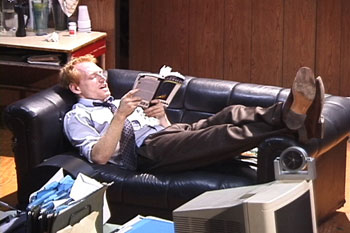
- San Francisco Chronicle February 14, 2020
- The Times of London May 10, 2012
- The New York Times December 16, 2010
- The New Yorker September 27, 2010
- New York Magazine October 6, 2010
- The New York Times October 6, 2010
- The New York Times February 5, 2010
- The Boston Globe May 15, 2009
- The Sydney Morning Herald December 28, 2009
- The Sydney Morning Herald May 19, 2009
- The Chicago Tribune November 17, 2008
- Time Out Chicago November 13-19, 2008
- Chicago Sun-Times November 15, 2008
- The Irish Times October 4, 2008
- The Independent October 3, 2008
- Irish Times September 29, 2008
- ArtForum: Best of 2007 December 1, 2007
- The New York Times Magazine December 9, 2007
- The New York Times September 16, 2007
- The Village Voice September 12-18, 2007
- The Bulletin September 4, 2007
- Publico July 4, 2007
- Die Presse June 17, 2007
- Klassekampen December 12, 2006
- Variety October 1, 2006
- Neue Zürcher Zeitung August 28, 2006
- Landboote August 28, 2006
- Tages-Anzeiger August 28, 2006
- The New York Times July 16, 2006
- Het Parool June 16,2006
- 8Weekly June 16, 2006
- Walker Art Center interview June 8, 2006
- NRC Handelsblad June 2, 2006
- De Volkskrant May 29, 2006
- Le Soir May 24, 2006
- Yale Alumni Magazine November/December 2005
Wonderfully Intoxicated By The Sober Language Of Fitzgerald
by Hanny Alkema
A man in a dingy office notices that his prehistoric computer isn’t working. Wearily he lets it be, takes a sip from his paper coffee cup, pulls out of somewhere a well-thumbed copy of “The Great Gatsby” by F. Scott Fitzgerald, and starts to read it. Out loud, imperturbably and without stopping. Even when the telephone rings, he calmly lets it ring away.
The coworkers who trickle in after him watch this with doleful eyes, or exasperatedly snatch up his telephone or his file folder for an obviously pressing conversation elsewere. His stoic reading tone is irritating, but little by little it works its way in and is even contagious. Almost every American knows this classic 1925 novel, and the girl who brings the mail is the first — at this point somewhat jokingly — to take over a line spoken by one of the characters in the book.
One by one the others fall under the spell too and gradually become participants in the story, a colorful and oft-filmed portrait of the “roaring twenties.”
The title character is a wealthy thirty-year-old who gives wild high-society parties but is meanwhile consumed with an undiminished longing for the sweetheart of his youth, Daisy, who is now married however to a certain Tom. Through the narrator, Nick (in this case the reader), he manages to make contact with her, and then the complications build up, under the influence of much drink, jealousy and ennui, to a tragic conclusion.
The contrast between the oppressive office environment and the extravagant debauchery in the novel could not be greater, but the performers in the off-off-Broadway company Elevator Repair Service capitalize on this with humor and imagination. If there is talk of a tawdry soiree in a rendevous-flat, then, with a chaotic scattering of papers, a few bottles of water and one secret whiskey bottle, the intended atmosphere is created. At another point the office work is centered around the invitations for one of Gatsby’s parties.
“Gatz” emerges as a double performance. It offers a picture not only of Gatsby’s decadent, riotous world, but also the furtive longings of apparently colorless office people for just such a money-saturated life of glamor. At the same time it feels like a glimpse behind the scenes into the rehearsal studio, with actors improvisationally trying to translate a novel into theater, making use of whatever is at hand: a spray bottle for a tear-streaked face, the back of a couch as a piano.
“Gatz” grows steadily nuttier and starts to look more and more like a cartoon. Thankfully with no sentimentality. In fact “Gatz” cannot really be called a stage adaptation. As a complete reading of Fitzgerald’s novel it is a marathon nearly seven hours long, more and more stirring as the chapters go by. On the first two evenings of this Holland Festival it was sadly split into two parts, but today and tomorrow the parts are played through one after the other. As it should be. Such a performance ought to draw you into an intoxicated reverie. With your ears wide open to the beautifully sober language of Fitzgerald. Wonderful.